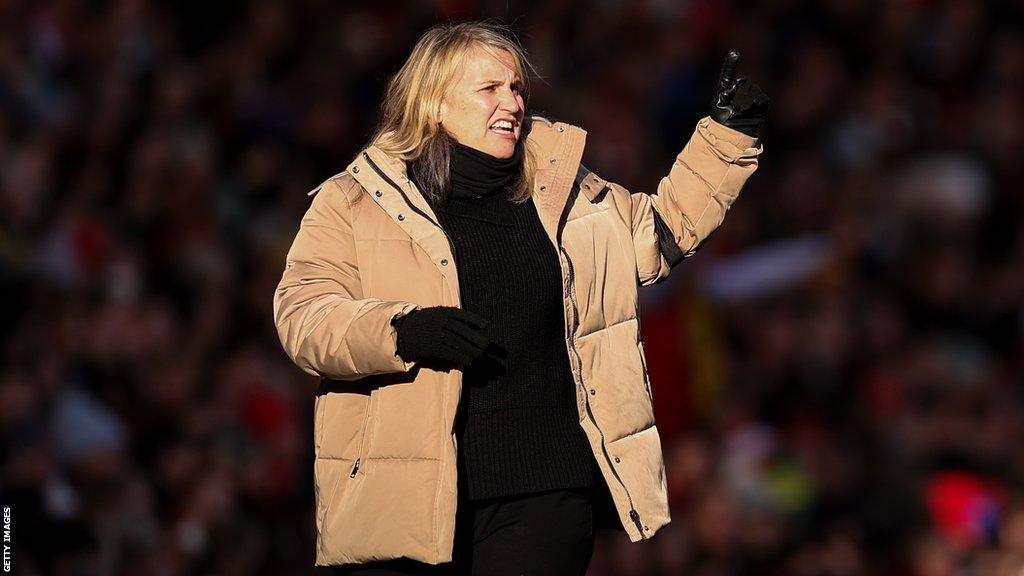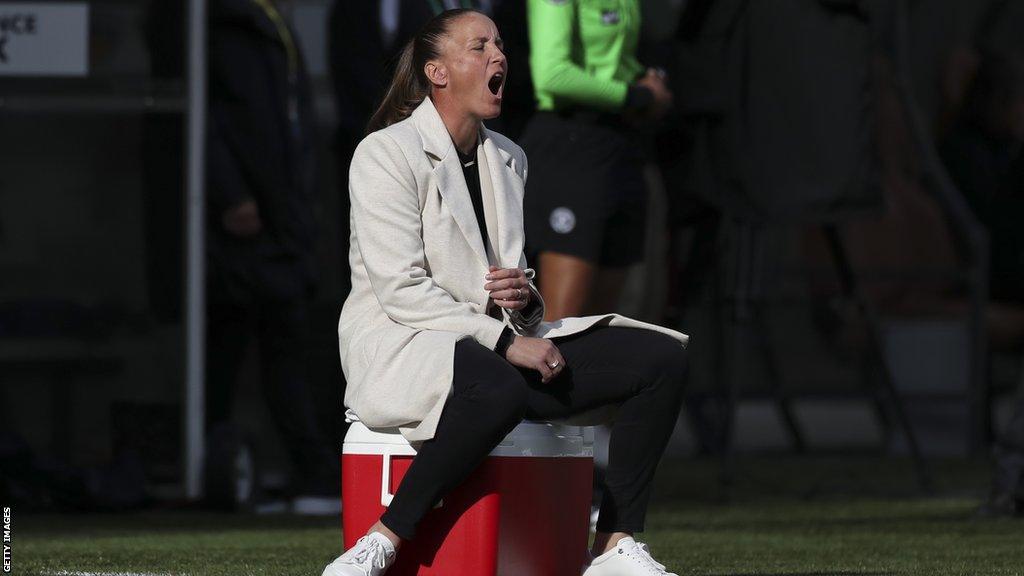Female WSL managers: Four in 12 bosses are women - is this a cause for concern?
- Published

Chelsea's Emma Hayes is one of four female managers at 12 Women's Super League clubs
In November last year the Football Association released a strategy for the future of women's football entitled Inspiring Positive Change.
Among the various promises and targets, English football's governing body stated an aim for 75% of female coaches to be in manager or head coach roles.
With the victorious England team at Euro 2022 being led by Sarina Wiegman, and Chelsea manager Emma Hayes being one of the most recognisable bosses in the domestic game currently, it appears at first that English football is being driven from the top towards this ambitious aim.
But across the Women's Super League (WSL) this is not the case.
Following Hope Powell's departure from Brighton and the appointment of Jens Scheuer, only a third of current WSL managers are female.
They are Hayes at Chelsea, Carla Ward with Aston Villa, Reading's Kelly Chambers and Tottenham manager Rehanne Skinner.
It is reasonable to expect some flux in these proportions, given there are fewer clubs in the top women's divisions in comparison to men's football - 24 in the WSL and Women's Championship, 44 in the Premier League and Championship.
"We continue to develop our female coaches and prepare them for the professional game. There are a number of strong female coaches who have the requisite experience and knowledge to lead and coach in the women's pro game," an FA spokesperson told BBC Sport.
However, as the audience for women's football grows, the spotlight on managers grows ever brighter - and so does the pressure to get results, to the extent that even extensive experience and knowledge cannot be enough to save a job.
Powell managed England from 1998 to 2013, becoming one of the first household names in women's football management. She took charge of Brighton in July 2017 and established them as a respected mid-table side in WSL.
But she was dismissed after four defeats in five games to start 2022-23. While the catalyst for her departure was an 8-0 home defeat against Tottenham, the other three losses were against title-chasing Manchester United, Arsenal and Chelsea - sides Brighton would not ordinarily be expected to beat.
'We spent five years building foundations'
Powell said in farewell comments to the club's website: "Sunday's heavy loss at home was particularly disappointing.
"As a club we've made a lot of progress in the past five years, but I feel now is the right time to step aside and allow a new coach to take the team forward with plenty of Super League football still to play this season."
She was initially replaced by interim coach Amy Merricks, who spoke of the groundwork Powell had done in establishing Brighton as an elite women's team.
"I'm fortunate I worked so closely with Hope," Merricks told the Mirror, external last month. "We spent the last five years building the foundations here. I believed in so much of what she did and the way she managed people."
Five years of work went after five games this season and, with Brighton seemingly facing a relegation fight, they moved for former Bayern Munich coach Scheuer.
So what can be done to persuade WSL clubs to give more opportunities to female managers? Primarily this is down to individual coaches, but the FA acknowledges it must work to provide pathways with the aim of getting a succession of female coaches to the top of the pro game.
"We cannot dictate who clubs employ - that is very much at their discretion," the FA spokesperson said.
"We are, however, working to grow the current pipeline, to create and develop more talented coaches with the relevant skills to handle the expectation and pressures of coaching in a professional women's club environment and the best league in the world.
"We are confident the work we are doing and are planning to do will increase the female talent pool. The search will go further than we have before to unearth talented female coaches who have the desire to work in the women's pro game.
"There is also the opportunity to help retiring players transition into coaching. There is more opportunity for coaching to be a career in the women's game than ever before."
For the WSL, the drop in the number of female managers has been sudden, and puts under scrutiny one of the standout factors about the league in comparison to its elite competition.
'Getting females into coaching is the first step'
A RunRepeat report from 2021, external revealed that at the time the WSL was the only elite competition where the majority of permanent head coaches had been female, at 56%.
By comparison, in Germany's Frauen-Bundesliga the proportion of permanent female head coaches in 2021 stood at just 7%.
In the American NWSL two years ago it was 10%, 17% in France, 22% in Spain, 27% in the Women's Champions League and up to 41% among the best international sides in the world.
The WSL had been improving, as the number of women as head coaches was only 25% in 2015 and 2016.
By 2020 the figure was up to two thirds, but has been in steady decline ever since.
Since the start of last season, Birmingham City lost Ward as manager to Villa, after which they appointed Scott Booth then Darren Carter before being relegated.

Casey Stoney departed Manchester United in May 2021 to move to San Diego
Casey Stoney departed Manchester United to be replaced by Marc Skinner, while earlier this campaign Lydia Bedford was sacked by Leicester and ex-Everton boss Willie Kirk was appointed.
The majority of these male coaches are more than qualified - Skinner managed Birmingham women and Orlando Pride previously, and has established United as serious contenders in the 2022-23 WSL title race.
However, the declining number of female coaches is something the FA says it wants to tackle.
It has dedicated grassroots coach developers who support females into coaching and help develop their skills. These developers also work within local County Football Associations to provide training and learning for coaches.
There are free online courses and targets, and funded places are available in the grassroots game for people from historically under-represented groups in football.
"Getting females into coaching is the first step, supporting them once in role and providing them with ongoing learning experiences that enables them to develop their expertise and understanding so that they remain in the game," the FA spokesperson said.
"Careers for female coaches is very much in its infancy, but we are determined to have a diverse workforce within our pipeline that are ready for the professional game."

Friends Will Be Friends: Stanley Tucci and his best friend talk about their love of food and art
All fired up and ready for business: Hopeful entrepreneurs enter the Dragons' Den...
